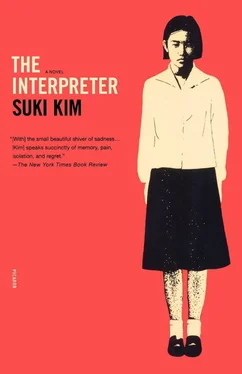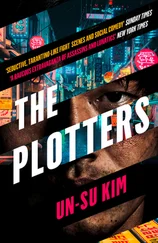She recognizes the accent in his Korean from his deposition. Each syllable drags into the next without any inflection. It is kind to the ears. From central Korea, where people speak slowly in a quiet murmur. She was told that its land borders no water, anomalous on a peninsula. The only province kept hidden in the hills. The people there must be full of longing, searching the sky for a glimpse of blue. Their gentleness might belie what is unrequited, and perhaps broken.
“He’d done deliveries for us in the past. My wife remembered how he’d wanted to buy a store but didn’t have enough cash. He had once offered to invest some money for renovation in exchange for a part ownership. So we sought out your father, made a partner deal, put his name on the lease.”
Who would do that? Why would they trust a stranger? How would they know that he wouldn’t put the store under his name and run away with it? But Suzy also knows that the world of immigrants has its own rules. Every man is guide to every other man. They don’t speak English, or read English. They don’t know the American laws. They might even break them without knowing. They are forever guilty before the customers, the policemen, the inspectors, the district attorneys, the IRS agents, the INS agents. Sure, America is the land of opportunity, and yet they wouldn’t recognize an opportunity even if it is waved in front of them. Only another immigrant can show them, in their language, in ways they can understand. A fellow countryman who might understand America better, who might be less afraid, who might be legal.
“Soon his wife joined us. Your mother. She wasn’t much of a talker. I hold no grudge against your mother. I only say that because I do believe that, deep inside, she was good. I saw her smile once, a real full smile. She was looking at a truck passing by. When I asked her what she was smiling at, she blushed and said there was a load of irises in the back of the truck, and the irises brought back some old memories. I never saw that smile again. Maybe it was too late by then. She seemed tired of life. Numb. ‘Dead inside,’ is what my wife said. She always did what was required of her. She wouldn’t work too hard or too little. She just did her duty with a minimum of fuss. She never talked back to your father. He’d sometimes call her names, bad insulting names in front of me and my wife. They were both well into their forties. It really wasn’t right to do that.”
What Suzy experiences is dread. The absolute dread of what is to come. It will only get worse, she thinks. This is not a good story. This is what I have come for.
“The business began to pick up after the renovation, although your father put down only a fraction of the money he’d promised. He also stopped doing the delivery work and hired someone instead. He was now practically running the whole store. Both our wives were behind the cash registers, since your father installed a second one for the night shift. I told him it was a bad idea. It’d only exhaust everyone. Seven days a week is one thing, but twenty-four hours? A couple of nights later, he called to say that our partnership wasn’t working, exactly what I’d been thinking, and that it’d be better if my wife and I were to stop showing up. I was flabbergasted. I thought he must’ve gone insane. It was my store, I mean our store, although he hadn’t fulfilled his end of the deal. What did he mean, stop showing up at my own store! That’s when he laid it on me—‘I could get you deported within twenty-four hours.’”
Sometimes the answer is there even before you are told. You may have suspected it all along. It has only been a matter of time.
“My wife overheard. She snatched the phone and started yelling. She told him he was a traitor, the lowest of the low. I’d never seen her lose control like that. All that work, those sleepless hours behind the register hadn’t been kind to her. She was tired, the way your mother had been tired. My wife still had some fire left in her. She wanted to fight out the battle. She didn’t want to give up. Your father threatened to report us if we showed up at the store just once more, but we ran there anyway. It’s so long ago now, but still so vivid. The ugliest, the saddest day of my life.” He takes another cigarette out of the pack. His fingers on the lighter are unsteady. It takes him a couple of tries to get a flame. He can only keep his eyes on the cigarette. Anywhere else will be her face, the girl’s face, which is too reminiscent.
“Your father called the INS right in front of us. He reported us while we stood there in our own house. It was like he’d done it before. He knew the number right off the top of his head. He didn’t even raise his voice. He looked calm through the whole thing. I saw your mother weeping in the corner. She was silent, even in crying. She didn’t want him to hear her cry.”
The informers.
No record of green cards or visa.
How many people did her parents sacrifice to obtain their citizenship? How many did they turn in for rewards?
Suzy never questioned why they moved each year. She did not think it odd when they could suddenly afford two bedrooms. She never thought twice when her parents bought a store, a house. She believed that it was the result of their hard work. But hard work, did it really pay off for all immigrants? Reporting an illegal immigrant is a vicious act, an immoral act. No immigrant can do it to another, knowing the fear, the absolutely mind-numbing fright, that a mere mention of the INS brings to those whose underground existence in the forgotten patches of Lefrak City is a source of a collective paranoia. Could her parents have been capable of such a betrayal? Was it out of greed? Could greed be enough motivation for turning on their own people? Why is Suzy not surprised?
“We ran. We shoved our bags into a car and drove to the first place we could think of that was far away. We ended up hiding out at a church member’s house on Long Island. That’s where my wife fell ill. All that fire inside of her suddenly went out. She kept blaming herself for what happened, for trusting your father. She kept saying that she was useless, that she was a burden to me, and that she was too old to start over. A few weeks later, while I was out looking for work, she took a whole bottle of sleeping pills. She was dead before we even reached the hospital. I buried her out there, in a town we’d never been to before. She was only forty-eight.” His voice is small and strained. He is relieved that his story is almost over. “She left me a note, begging me to go back to Korea. But I’m still here, and the only thing I have to show for the past thirteen years is this wretched age, and burying my wife, who wasn’t old enough to die. But how could I go back to Korea? Who would look after her? Who would lie beside her out on Long Island?”
From the minute Suzy set foot in this dark, desiccated corner, she might have known that it was her parents who drove him here, who called her here, who wanted her to hear everything, who are now asking her to make judgment on their lives, which, she is finally convinced, could not have been saved.
The tea is tepid. The barley flakes have sunken to the bottom. Boricha. It may be years before she tastes it again. Will she like it still? Will she then recall this room, where a dejected man has finally revealed to her what might have been at the root of her parents’ murder?
“But I had nothing to do with your parents’ death,” he says quietly. “That wouldn’t have brought my wife back.”
What about others? He mentioned that there were many with grudges against her parents. None of them could have gone to the police. How could they? Illegal immigrants, the cheapest target before the law. If her parents had stolen this man’s store right under his eyes and driven his wife to suicide, what else had they been capable of? Could her parents have confided to the police as well? Could they have traded information for some sort of protection?
Читать дальше












